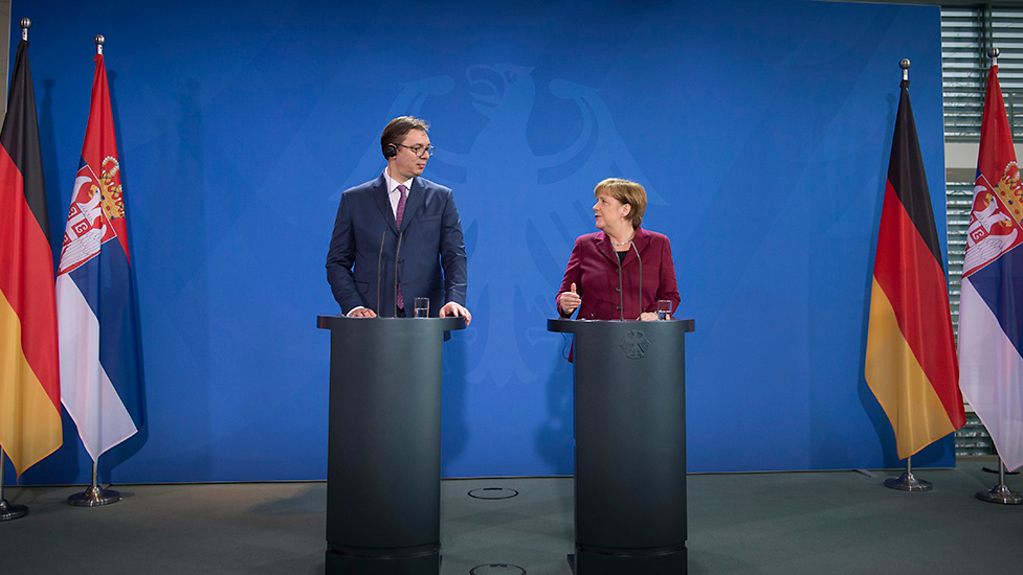Angela Merkel receives Prime Minister Aleksander Vučić
During the Serbian Prime Minister’s visit, the Chancellor praised his country’s reforms. She said that he has made enormous efforts to put in place an environment in which accession negotiations with the EU can proceed.
3 min reading time

During Prime Minister Aleksander Vučić’s visit, Angela Merkel praised Serbia’s reforms
Photo: Bundesregierung/Bergmann
Angela Merkel also praised Serbia’s role in the refugee crisis.
Germany and Serbia are two countries with many intertwined connections and friendly relations, said Chancellor Angela Merkel in a statement. She received Aleksander Vučić, Prime Minister of the Republic of Serbia, at the Federal Chancellery. The meeting, originally planned for Friday, was brought forward to Tuesday.
Both sides would like to see German-Serbian cooperation develop further, stressed Angela Merkel. In this regard it is very positive that Prime Minister Aleksander Vučić has undertaken major reforms over the last few years that have paved the way for increased economic efficiency, and a better investment climate. The privatisation of state-owned enterprises has made good progress, reported the Chancellor, and the country’s 1.8 per cent growth rate is evidence that Serbia is on the right path.
400,000 Serbs are permanent residents in Germany, which is one of Serbia’s most important trading partners. The volume of bilateral trade recently hit almost four billion euros. German direct investment in Serbia is worth 1.3 billion euros.
EU accession negotiations on the right path
EU accession negotiations with Serbia are also progressing, said Angela Merkel. In February 2017, another two chapters were opened. This is a sign that reform efforts are making progress and that they comply with the standards set by the European Commission and member states. Currently the accession negotiations are focusing on rule-of-law reforms. Freedom of the press and freedom of opinion are vitally important in this context, she said. The reforms are essentially in Serbia’s own best interest, and the country’s economic success proves that the reforms are having the desired effect.
Region struggling to ensure stability
Serbia is part of a region that is still having to struggle to achieve stability, said the Chancellor. Serbia’s Prime Minister has always worked to ensure that development is "peaceful and rational". In this context, Angela Merkel mentioned Kosovo. The impact of history can still be felt today. She expressed her hope that the tensions in the region can be overcome again. In this regard she mentioned the Berlin process, which is to be continued with a meeting in Trieste in summer. This process serves to bring the countries together, explained Angela Merkel, and promote measures like cross-border infrastructure projects.
Illegal migration is a challenge for Serbia
The Chancellor pointed to the challenges facing Serbia as a result of illegal migration. Serbia has always worked to register refugees and do its bit, and the country deserves our greatest respect, she said. Unfortunately illegal migration along the Balkan Route has not yet ceased. The two sides will discuss ways of supporting Serbia in its efforts to deal with this problem, said Angela Merkel.
German-Serbian cooperation
Cooperation aims, among other things, to foster the continued rule-of-law and democratic transformation of Serbia, as well as the country’s EU accession process. Over the last few years Germany has become Serbia’s largest bilateral donor, and has provided more than 1.6 billion euros within the scope of bilateral development cooperation since 2000. Germany is also supporting Serbia in the context of the refugee crisis, with humanitarian assistance funds.